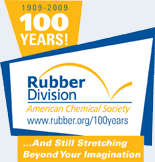![[ Visit ACS Rubber Website ]](images/logo.jpg) |
|
Ultrasonic Treatment of PEN/LCP Blends During ExtrusionTuesday, October 14, 2008: 11:30 AM
Ultrasonic extrusion of blends of wholly aromatic liquid crystalline polymer (LCP) and polyethylene naphthalate (PEN) was studied. Rheological, thermal, mechanical and morphological characterization of the blends was performed. The viscosity of untreated PEN was greater than the viscosity of untreated LCP, while viscosity of the untreated blends varied with composition. Blends became shear thinning with increasing LCP content. PEN treated at high ultrasonic amplitudes showed lower viscosity and Tg, indicating degradation under action of ultrasound. Untreated PEN/LCP blends became substantially stronger and stiffer with addition of LCP, while the elongation at yield and impact strength decreased. Improvements were recorded in the Young's modulus, tensile strength and impact strength of 90/10 PEN/LCP blends with treatment at an ultrasonic amplitude of 7.5 mm. In situ created LCP nanosize fibrils in the skin region, and LCP droplets in the core region were observed in injection moldings of PEN/LCP blends. Improvements in interfacial adhesion between the LCP and PEN phases with ultrasonic treatment were observed through SEM pictures. The size of LCP droplets and fibrils increased with treatment at an ultrasonic amplitude of 10 mm due to the lower viscosity of treated PEN. The latter led to reduced mechanical properties of blends. The effect of adding a transesterification catalyst, tetrabutyl orthotitanate (TBOT), to 80/20 PEN/LCP blends was also studied without and with ultrasonic treatment during extrusion.
|
